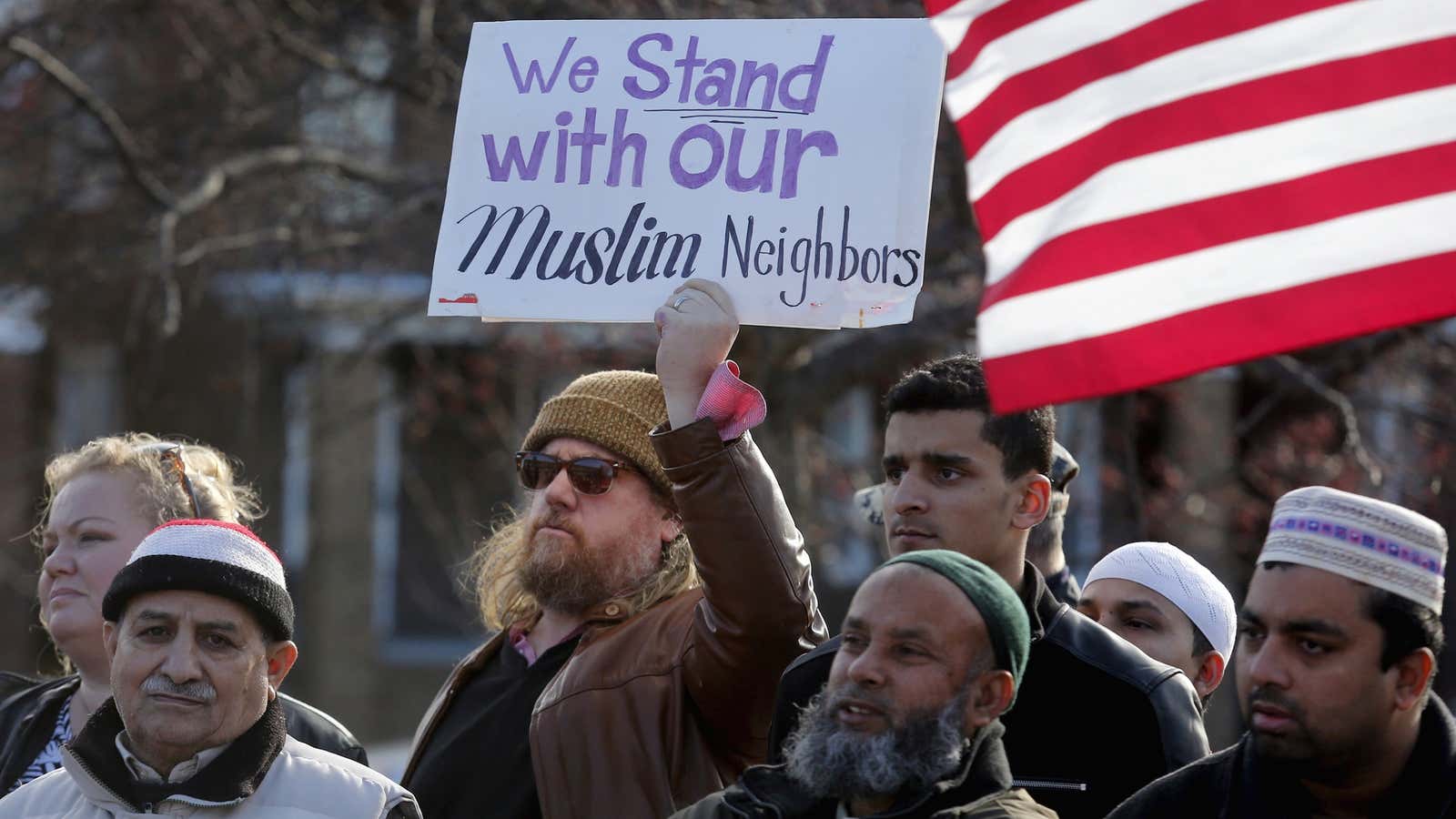This year has been filled to the brim with tragedy—from rampant gun violence, police brutality, and senseless mass shootings to the Paris attacks, ISIL, and the many bombings and drone strikes from Syria to Afghanistan (one of which struck a Doctors Without Borders trauma center). Seeing that we’re heading into an election year here in the United States, a flurry of sensationalist media coverage and hateful, dangerous political rhetoric has surfaced that is alienating millions of Americans.
Organizations like the Muslim advocacy group CAIR (Council on American-Islamic Relations) have noted a troubling spike in anti-Muslim hate crimes in the past few weeks, as events like the San Bernardino shooting and alarmist rhetoric from presidential candidates have combined to embolden those already harboring bigoted and xenophobic attitudes. Muslims have been bracing themselves for the worst, creating crisis safety manuals and trying to prove their innocence through preemptive apologies and condemnations.
The 24-hour news cycle has done nothing to assuage these fears, often engaging in blatantly biased, one-sided reporting or fanning the flames of bigotry. And though there are many reasons for Muslims and anyone who may “appear” to be Muslim (Arabs, South Asians, and even Latinos) to be cautious and do whatever it takes to ensure their safety, the constant barrage of negative news has managed to drown out the many positive acts of goodwill and solidarity that have also happened over the last few weeks.
A population living in fear is often one that is silenced, one that readily foregoes rights and liberty for security, one that defers to those in positions of authority and, as history shows us, lets unspeakable acts happen in its name. Politicians like Donald Trump capitalize on this fear, and so the fearful flock to him (and to gun stores).
The Muslim community is traumatized, its children beat up in schools and called terrorists, its women disrespected, its mosques vandalized. But, for our own mental and emotional well being, we must not forget the countless neighbors, friends, professors, doctors, and strangers who have shown solidarity in the face of bigotry. As we keep track of the hate crimes, let us also note the gestures that remind us of each other’s humanity.
Below is a partial list of the random acts of kindness and solidarity that have surfaced over the past few weeks:
Pakistani doctor Fahim Rahim was treated to a surprise from his 91-year-old patient, Louise, at the Idaho Kidney Institute, where he works, on Dec. 4.
As ABC News reports:
“Grandma Louise” has been a patient of Dr. Fahim Rahim at the Idaho Kidney Institute for the last couple of years. Last week, after Dr. Rahim was asked to “defend” himself as a Muslim and comment on Donald Trump’s rhetoric on a local radio show, the 91-year-old Mormon woman, who was scheduled to see Dr. Rahim that Friday, gave him a set of stuffed animals she crocheted herself.
“She has seen more of this country than any of us, including Mr. Trump … her message was love, humanity and humility,” the nephrologist said, adding that “Grandma Louise” didn’t even know who Trump was when she gave the doctor the stuffed animals. “That was kind of a very simple message.”
“That was a magical moment … I felt like I was to heal her but she came in and healed my wounds,” Rahim told ABC News. The stuffed animals are a “symbol of unity and faith and how me stand together.”
“We have to understand that the majority of the people living in this country are like that 91-year-old woman,” Rahim said. “This 91-year-old single-handedly has proven that no matter of how these forces do, no one will be able to destroy us or divide us.”
Rahim’s post about the gesture went viral on Facebook, receiving over 38,000 likes and over 8,000 shares.
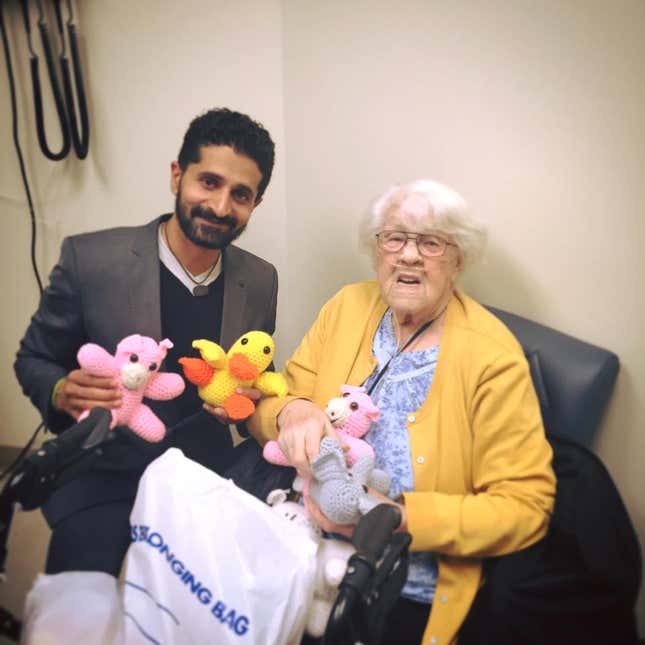
This week, activist and documentary filmmaker Michael Moore stood in front of Trump Tower in New York City holding a sign that read, “We are all Muslim.” He also wrote a letter to Donald Trump, which has already gone viral on social media.
The letter reads (in part):
Fortunately, Donald, you and your supporters no longer look like what America actually is today. We are not a country of angry white guys. Here’s a statistic that is going to make your hair spin: 81%t of the electorate who will pick the president next year are either female, people of color, or young people between the ages of 18 and 35. In other words, not you. And not the people who want you leading their country.
So, in desperation and insanity, you call for a ban on all Muslims entering this country. I was raised to believe that we are all each other’s brother and sister, regardless of race, creed or color. That means if you want to ban Muslims, you are first going to have to ban me. And everyone else.
We are all Muslim.
Just as we are all Mexican, we are all Catholic and Jewish and white and black and every shade in between. We are all children of God (or nature or whatever you believe in), part of the human family, and nothing you say or do can change that fact one iota. If you don’t like living by these American rules, then you need to go to the time-out room in any one of your Towers, sit there, and think about what you’ve said.
Moore is also calling on non-Muslims to take action: “I’m asking everyone who reads this letter to go here and sign the following statement: ‘WE ARE ALL MUSLIM’—and then send post a photo of yourself holding a homemade sign saying ‘WE ARE ALL MUSLIM’ on Twitter, Facebook, or Instagram using the hashtag #WeAreAllMuslim. I will post all the photos on my site and send them to you, Mr. Trump. Feel free to join us.” You can sign Moore’s letter here.
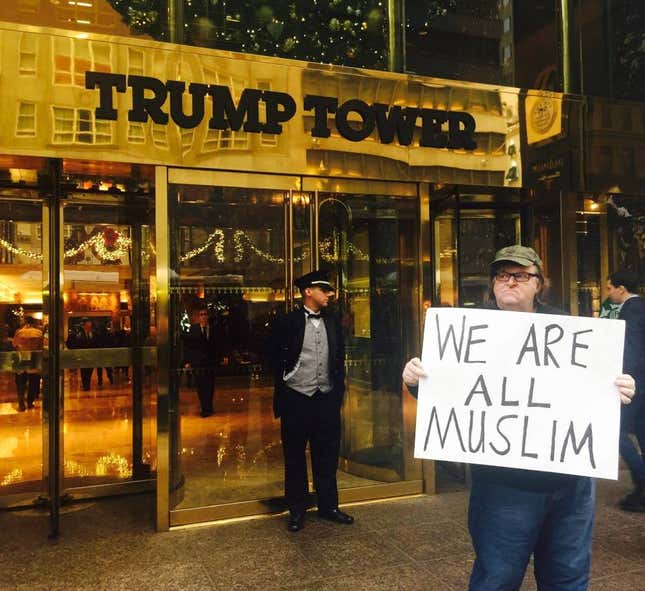
American City Diner in Washington, DC, put up a sign that reads “Standing with American Muslims.”
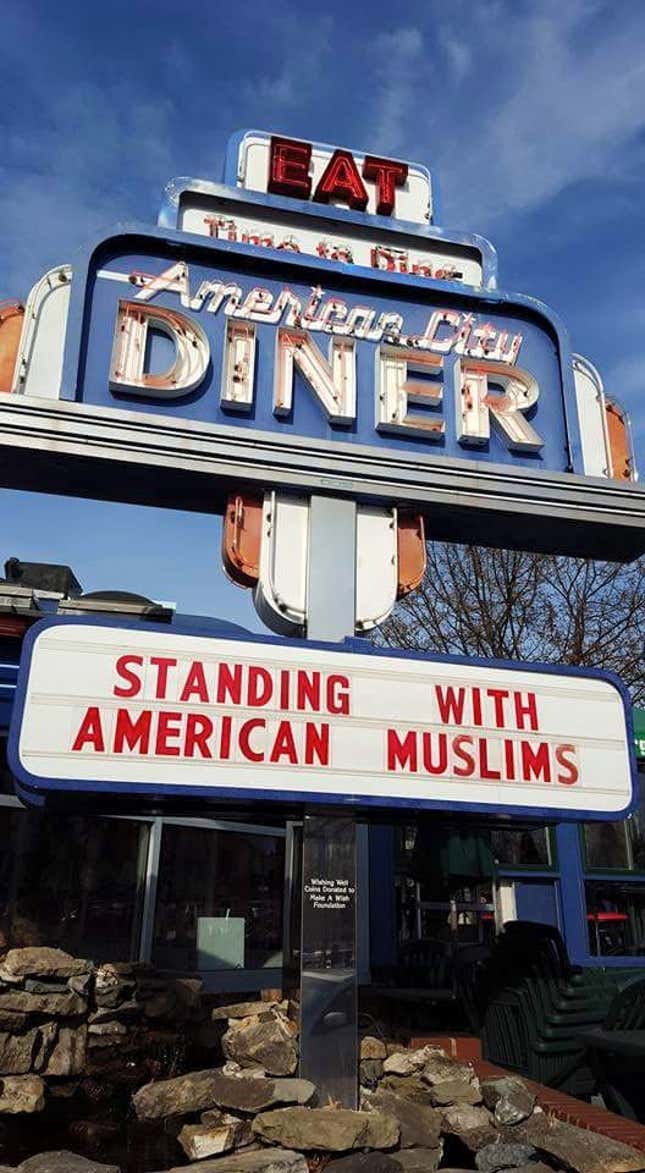
Someone who described herself as a “white atheist woman” left an anonymous note, along with a $20 bill, for the Islamic Community of Atlanta in Fayetteville, Georgia.
The handwritten note reads:
Hello, I’m a white Atheist woman, but I strongly believe that everyone has the right to practice their religion in a safe place no matter what their religion is. I’m sorry for any negativity you may have experienced because of ignorant fear-mongering. Where there’s hate there is a greater amount of love and you are loved. I know $20 isn’t much, but I hope it helps with something.
A kind stranger left this note at a mosque in Illinois:
One Christian left a note for the Islamic Center of the Northeast Valley in Scottsdale, Arizona, that read “Today I give thanks for all of you. You make me a better person.”
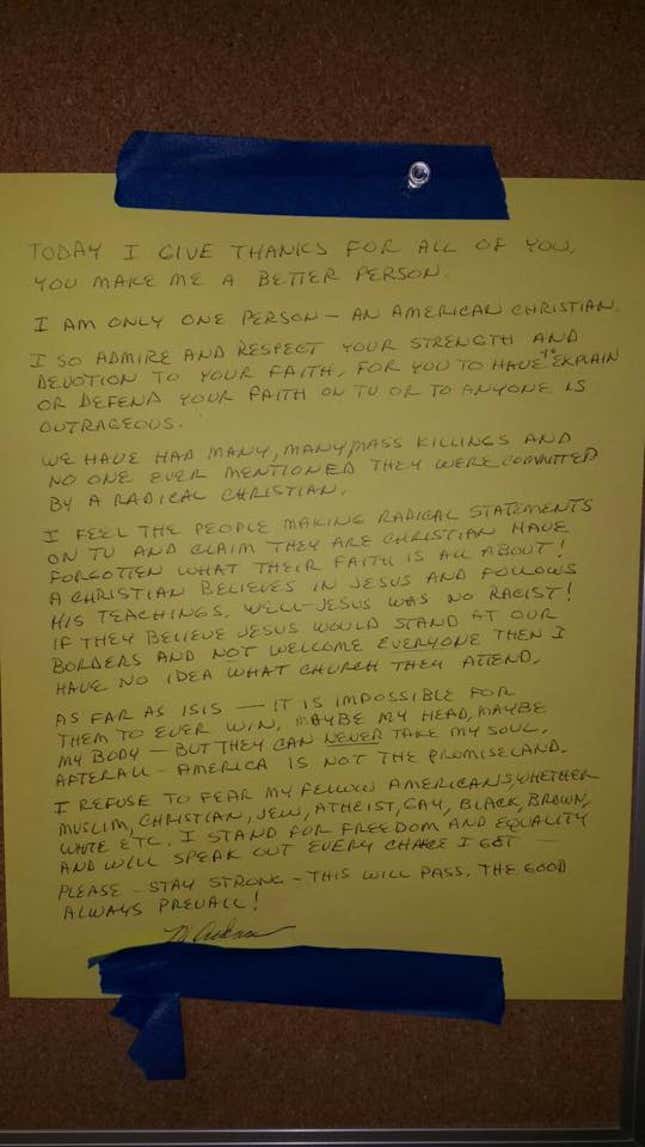
A group of 700 organizations and individuals started a campaign called “We Are Better Than This” and took out a full-page ad in The New York Times that read: “Is this America? When has hate ever led to progress? Is this really what we want America to be? We are better than this.”
You can pledge your support for the campaign here.
Democratic presidential candidates Bernie Sanders and Martin O’Malley visited mosques to express solidarity and condemn the hate speech and suspicion directed towards the Muslim community.
“Do we come together? Or do we allow demagogues to divide us up?” Mr. Sanders said. “That is the issue of the moment.”
Seven-year-old Jack Swanson of Texas donated all of his piggy bank money—$20 in pennies he had been saving up to buy an iPad—to the Islamic Center of Pfugerville after it was vandalized last month.
Author and human rights lawyer Arsalan Iftikhar was so touched by the young boy’s generosity that he mailed him an iPad to thank him on behalf of the Muslim community.
And finally, a more personal example:
One of my best friends is a Syrian American fourth-year dental student who wears hijab. She is currently on her special-needs rotation and just shared this story with me.
One of her patients is a man who had a stroke a few years ago and is wheelchair bound, unable to move or speak without much difficulty. When he saw my friend, he smiled and pointed to her headscarf. “Muslim?” he asked. When she responded that she was in fact Muslim, he gave her a big smile and thumbs up. His wife explained to her that his previous caretaker was Muslim and that he loved her tremendously. The man later motions for my friend to come closer to him.
Struggling to speak, he musters all his energy to give her a simple message. She doesn’t understand at first, and he struggles to repeat, “Don’t worry.”
“Don’t worry?” she asks.
He nods and touches her hijab, the weight of his message apparent in his eyes, the only part of his body he can move on his own. “Man, if you could have seen his eyes,” she tells me. “It’s like he just desperately wanted me to know that.”
My point is not that there is nothing to fear, nor that all is good with the world. We live in a scary time, where we routinely have to come to grips with senseless crimes and misplaced hatred. But amidst the violence and the chaos, the sensationalism and the speed with which bad news travels, expands, and multiplies, we are often too blinded to see the compassion and warmth we encounter on a daily basis. Words are powerful—the hateful ones, but also the kind ones. Sometimes it is necessary to remember that, and to tell each other, even when we struggle immensely to do so: Don’t worry.
